Welcome to the July 2020 issue of the Global Washington newsletter.
IN THIS ISSUE
-
-
- Letter from our Executive Director
- Issue Brief: Navigating the Economic Fallout of Covid-19 and Building Back Better
- Organization Profile: Collaboration Enables Impact Investing Firm Capria to Support Thriving Entrepreneurial Ecosystems, Even Amid a Global Pandemic
- Goalmaker: Sasha Muench, Mercy Corps Country Director, Palestine
- From Our Blog: Responding to COVID-19 with Financial Inclusion Solutions
- Welcome New Members
- GlobalWA Member Events
- Career Center
-
Letter from our Executive Director
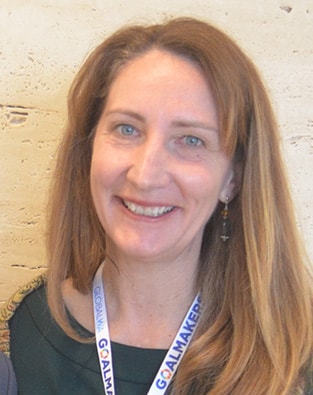
Recently, a colleague asked what I am optimistic about during these troubled times, and I couldn’t find an answer. The immediate and long-term impacts of COVID-19 are devastating and have widespread global implications. In addition to an unparalleled health crisis, the resulting economic downturn and loss of livelihoods has been severe.
As a result of the pandemic, an estimated 71 million people around the world will fall into extreme poverty, defined as living below $1.90 a day, undoing years of progress on this front. Those most vulnerable are low-income families in developing countries. In certain regions, the loss of income and inability to buy food represents a far greater threat than exposure to the virus.
Despite feeling the weight of this moment and the enormity of the challenges ahead, I am honored to lead a network of 160 incredible organizations that are responding head on to the challenges COVID-19 poses to people in the Global South. Our members are working every day to strengthen the safety net for families in need and bolstering recovery efforts. Seeing the speed and breadth of their collective responses, I can honestly say that I have hope for the future. I encourage you to read more about our members’ work, and let me know what makes you feel inspired and hopeful.
Over the past few months, we reported on the global health implications of COVID-19, as well as the impact on refugees, food security challenges, and the importance of sustainable clean water access. In this issue, you will learn more about the economic implications of this pandemic and how our members are supporting markets and communities through these overlapping challenges.
When we seek to understand solutions rather than focus only on the enormity of the problems, we can regain our optimism. Global Washington will continue to amplify the solutions our members are implementing and showcase what is working around the globe as we fight this pandemic together.

Kristen Dailey
Executive Director
Issue Brief
Navigating the Economic Fallout of Covid-19 and Building Back Better
By Joanne Lu
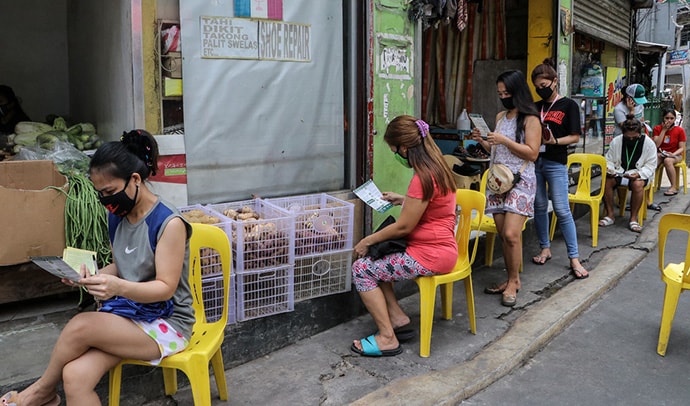
Women from a community in Quezon City, Philippines line up to enter a market as the local government strictly imposes social distancing in public places. They also received flyers from IDEALS and Oxfam containing relevant information about COVID-19 and essential tips on how to cope with the enhanced community quarantine. Credit: Ideals
The COVID-19 pandemic is an unprecedented global health crisis. But now it appears that by some measures it will be an even greater and more lasting economic crisis, particularly for the poor in developing countries.
Since 1990, nearly 50 million people have climbed out of poverty every year. It’s one of the greatest achievements of the millennium. But now, the pandemic has plunged the global economy into the deepest recession since World War II, according to a recent report by the World Bank. And an estimated 71 million will likely be pushed back into poverty for the first time since 1998, a new UN report warns. According to the World Bank, this is the first global recession to be triggered solely by a pandemic.
So far, economic projections have shown worse outcomes for advanced economies than developing countries, because the pandemic surged in wealthier regions first, causing lockdowns that suspended and shuttered businesses. But from the beginning, economists have warned that there remains a great deal of uncertainty around the pandemic and its impacts. And, lower-income countries are likely to suffer severe and more lasting impacts because many already have less health-care infrastructure, weak social safety nets, large informal economies, a higher dependence on trade and more people living at or around the extreme poverty line. Now that the pandemic is beginning to surge in countries across South America, South Asia and even Africa, economists and development experts are intensifying their calls for global support and innovative interventions. With lockdown measures in place and business activity disrupted, people who were dependent on meager daily wages are facing hunger and exploitation. And as 90 percent of students worldwide have been kept out of classrooms by school closures, developing countries’ future growth potential is also being severely undermined.
Even before the pandemic, many emerging and developing countries struggled to provide adequate social protections for their citizens due to a lack of resources rooted in problems such as over-indebtedness and poor governance. Now, perhaps more than ever, social safety nets are crucial for keeping households afloat, which is why many humanitarian and development organizations, like Oxfam America and Mercy Corps, have scaled up their food assistance, cash transfers and voucher programs.
Oxfam is also advocating for an “Emergency Rescue Package for All” that would cancel trillions of dollars in debt for developing countries and would increase the funds available to them by at least a trillion. With more funding, countries could expand their social protection programs, including unemployment insurance. But developing countries are facing a serious hurdle with important interventions like unemployment insurance: a huge number of people work in the informal economy, or “off-the-books.” According to the UN’s International Labor Organization (ILO), more than 2 billion people globally make their living in the informal economy; 93 percent of them are in emerging and developing countries. In Africa, nearly 86 percent of employment is informal. This means that governments are having trouble targeting their economic aid when a large portion of small businesses and workers do not file taxes or even have access to formal banking. In a recent report, Mercy Corps wrote that “informality continues to be a significant factor determining individuals’ ability to adapt.” The UN’s Sustainable Development Goals 2020 report estimates that just in the first month of the pandemic, workers in the informal economy saw their incomes drop 60 percent.
Given the need to rapidly deploy economic assistance across the board – including to informal workers, many of whom are the poorest of the poor – some governments and organizations have turned to digital payments, mobile money, and community-based virtual currency to help families receive aid and purchase essential items, like food and soap, without using cash while social distancing. The Mifos X open source banking platform by Mifos Initiative, for example, allows governments to quickly and affordably open cloud-based bank accounts. Individuals, many of whom were “underbanked,” can then receive cash and benefit payments through these accounts, and businesses can access credit and reschedule loans. In addition, Google and the Bill & Melinda Gates Foundation recently also announced Mojaloop, a free, open-source payment platform that connects many different banking and payment systems across a country. Although the need for financial inclusion is time-sensitive during the current crisis, these digital solutions will help developing countries continue to grow over the long run.
An unprecedented characteristic of the COVID-19 economic crisis is how widespread the impact has been. Because advanced economies have also been battered by the pandemic, they’re less able to help sustain emerging and developing economies through trade. Migrant workers in wealthier countries are also experiencing a loss in wages, meaning they’re unable to send as much money home to their families. For developing countries, these remittances are an essential source of income. The World Bank is predicting a 20 percent drop in remittances this year, the sharpest decline in recent history. In Africa, a hit to tourism is also “decimating” the livelihoods of middle-class workers, who were driving the continent’s economic growth, according to a recent article in the New York Times.
As Microsoft President, Brad Smith, recently wrote in a blog post, “the pandemic has shined a harsh light on what was already a widening skills gap around the world – a gap that will need to be closed with even greater urgency to accelerate economic recovery.” Microsoft’s answer to this problem is a new “global skills initiative” that will help 25 million people around the world gain digital skills by the end of the year. The initiative will identify in-demand jobs and the skills needed to fill them, provide free educational content to develop those skills, and provide low-cost certifications and free job-seeking tools. But digital skills aren’t the only path forward. Einstein Rising, a business accelerator for social entrepreneurs in Africa, has launched online “Skills for Change” workshops that teach practical, income-generating skills, such as how to make liquid soap and petroleum jelly for dry skin.
But perhaps more than anything, the pandemic is highlighting just how important it is to develop strong partnerships in our interconnected world. The most vulnerable among us will not be able to survive the impacts of the pandemic without global support; at the same time, the pandemic has made it clear that no one is truly safe and secure unless all of us are. Organizations like Global Partnerships, Upaya Social Ventures and 3rd Creek Foundation are leaning into their partnerships with social enterprises and other organizations in order to help keep everyone – investors, organizations, businesses and households – afloat in these trying times.
Without a doubt, the COVID-19 pandemic is an economic shock of historic proportions that will reverse much of the progress the world has made toward eradicating poverty. However, with innovative solutions and global cooperation, this crisis also presents the world with an opportunity to build back better if we extend the interventions being implemented now into a post-pandemic society. With stronger social safety nets for everyone, financial inclusion through technology and new skills for a changing global economy, perhaps a more equitable society awaits.
The following GlobalWA members are working to address the economic impacts of the COVID-19 pandemic in developing countries.
Awamaki
Awamaki is a small non-profit that connects Andean artisan weavers with global markets to create economic opportunities and improve social well-being in rural Peru. Peru has had the longest lockdown in the world, with borders closed and tourism, transportation, and commerce shuttered for over three months. Awamaki’s partner artisans and their families rely almost entirely on tourism for their incomes and as a result, their villages have been severely affected by the lockdown. Awamaki is fundraising for emergency food relief so the artisans can feed their families while there is no work. The organization is also supporting 160 artisan women and their families with food donations. Additionally, Awamaki is looking for creative new opportunities, including supporting the artisans in making face masks to prevent transmission of the virus that causes COVID-19. Additionally, they have been hosting weaving demonstrations on Zoom, a new way to bring income to their families.
3rd Creek Foundation
Through grants and impact investing, 3rd Creek Foundation supports early stage programs that create sustained economic improvement and dignity for the ultra-poor. The foundation’s recent fundraising campaign, #raise20run20, will support its partner organizations including non-profit organizations that run entrepreneurial training programs as well as small businesses that employ the ultra-poor with dignified jobs.
Bill & Melinda Gates Foundation
The Bill & Melinda Gates Foundation has made critical investments in speeding up development of new tools to address the COVID-19 pandemic, including advanced diagnostics, therapeutics, and vaccines. In addition, the foundation has highlighted the disproportionate impact the pandemic is having on women’s health and economic well-being. Recommended policy actions include ensuring women are essential recipients of financial aid and emergency cash transfers, directing stimulus dollars toward women-owned businesses, increasing women’s access to cell phones in order to manage their money digitally, encouraging flexible work arrangements, and including diverse experts and leaders in decision-making.
Capria
Capria is a global impact investment firm managing multiple funds that accelerate the flow of capital to deliver superior returns in emerging markets. Capria holds COVID-19 workshops with its fund managers twice a week to share knowledge and learn from the experience of its partners across the network. The company has found investments in essential products and services to bottom-of-the-pyramid consumers to be a resilient strategy because they serve critical needs even during times of uncertainty.
Dalberg
Dalberg has been actively supporting its clients globally on how to respond to the COVID-19 pandemic. This has involved helping large foundations pivot their strategies and grant-making; assessing vaccine discovery efforts for improved access in the developing world; designing bridge finance facilities; and, increasingly, adapting to the “new normal.” A survey Dalberg conducted on leaders at various global philanthropic organizations provides insight into their shifting priorities around the current pandemic. Another report Dalberg co-authored with World Wildlife Fund details the root causes of the COVID-19 crisis and recommends ways to mitigate future pandemics.
Global Partnerships
Global Partnerships is an impact-first investor dedicated to expanding opportunity for people living in poverty. The organization makes loans and early stage investments in social enterprises that deliver market-based products and services that empower people to earn a living and improve their lives. GP supports its partners in meeting the needs of the most vulnerable during the pandemic. For example, BRAC International, a global microfinance network in Liberia, Tanzania, and Uganda has begun conducting telephone outreach to clients, disseminating health guidance through radio broadcasts, deploying a rapid income and food security assessment to better understand client needs, and proactively linking its clients to non-profit and government resources. Another, Acceso El Salvador, is an agricultural enterprise that purchases goods from smallholder farmers and fishers. Acceso has immediately adapted its technical assistance to focus on pandemic-safe practices while providing farmers with frequent updates on which produce is in high demand. A third partner, Friendship Bridge in Guatemala, responded to the drop in revenue for their female artisan clients by working with them to produce and sell face masks to meet the growing global need.
Foster School of Business (University of Washington)
For over a decade, the Foster School of Business has worked with the Self-Employed Women’s Association (SEWA), “a trade union that promotes the rights of self-employed female workers and aims to organize them for full employment and self-reliance,” according to a former UW Global Business Center Global Consulting Project participant. The partnership brings MBAs together with small business owners in rural India, where students complete projects for the organization as part of their course. SEWA members have produced over half a million face masks (as of April) in response to the coronavirus pandemic.
Landesa
As a global leader in land rights, Landesa is positioned to assist its partners in government and civil society in responding to COVID-19. The organization is leveraging its networks in Asia and Africa to provide resources and expertise for local partners on the front lines of this global health crisis. In Liberia, Landesa is using its nationally broadcast radio program to educate the public on health, hygiene and social-distancing measures to prevent transmission of the virus. In Tanzania, Landesa is adapting a mobile application, “Law On Your Palm,” which connects rural women with access to legal services, to be used to share information about COVID-19. And in Myanmar, Landesa is helping to equip the Forest Department with protective masks and gloves for use by department staff carrying out essential fieldwork.
Mercy Corps
Mercy Corps works in more than 40 countries in the Americas, Africa, Middle East and Asia, providing assistance to communities facing crises of all types, including vulnerable people whose circumstances are being made worse by the pandemic. Mercy Corps is responding to the urgent needs, while also investing in long-term solutions that build resilience to future crises. To support the most vulnerable families, Mercy Corps is providing emergency cash assistance so they can cover essential expenses such as food, water and rent. Cash also jumpstarts the local markets and businesses, enabling them and the larger economy to recover. Additionally, Mercy Corps helps small businesses adapt and recover after a crisis, as they are often both the engines of the economy and the most vulnerable to economic disruptions. Through technical support, grants and mentorship, the agency helps businesses get back on their feet, increase their chance of long-term success, and become better prepared for future disasters. A key aspect of Mercy Corps’ work is helping individuals and business owners access financial services and increase financial literacy, so that they have the tools and skills to save for the future, borrow to invest in their businesses, and manage risks no matter the crisis.
Moving Worlds
In partnership with SAP, leading impact investors, and social enterprise thought-leaders, the MovingWorlds Sustainable Growth of Revenue for International Development (S-GRID) program helps social enterprises, and the individuals within them, to create sustainable revenue streams by partnering with the corporate sector and connecting into global value chains. As we begin to rebuild our post-COVID world, there is an unprecedented opportunity to go beyond the status quo to build more just, equitable, and sustainable global systems.
Oxfam America
Oxfam America estimates that half a billion people could be pushed back into poverty by the COVID-19 pandemic. During a time of extreme global inequality, this could set back the fight against poverty by a decade, and as much as 30 years in some regions such as sub-Saharan Africa, The Middle East and North Africa. To address the immediate need for economic support, Oxfam is providing cash and in-kind food assistance to those who need it in more than 15 countries around the world, including for refugees, displaced people, and vulnerable families, including in South Sudan and Central African Republic. In the Dominican Republic, for example, Oxfam is working to transfer cash to 4,000 families (benefiting some 20,000 people) to buy basic goods. Oxfam is also partnering with small-scale food producers to amplify their voices in the call for global action on the looming food crises. Oxfam understands that addressing COVID-19’s economic impacts requires a multi-sectoral response and the cooperation of local and international organizations, corporations and governments. At the global level, Oxfam has called for the international community to fully fund the UN’s humanitarian appeal and cancel debts so that poor countries are able to focus on critical needs. Oxfam has also called for an emergency rescue package for all that provides cash grants to those who have lost income and creates at least a trillion dollars in international reserves to dramatically increase resources available to countries.
Pangea
Pangea has supported its community partners around the world by offering additional flexibility in their grant timelines and supporting organizations as they have shifted their programs toward COVID-19 response. Child Empowerment Program in Uganda, for example, has been producing thousands of masks, sewn by graduates of its tailoring program who received training at CEP’s vocational school (with previous funding from Pangea). They will distribute the masks free of charge to health workers and women who are still struggling to sell vegetables in the market to support their families.
Rise Beyond the Reef
Rise Beyond the Reef bridges the divide between rural remote indigenous Fijian communities and the outside world, promoting women as leaders of their communities on the frontlines of climate justice. The organization has been working with its partners in Fiji to distribute protective COVID-19 kits with washable masks, gloves and disease awareness infographic flyers. Additionally, Rise Beyond the Reef has helped distribute basic food rations to remote partner communities and marginalized areas inside Fiji’s restricted areas to prevent them from traveling to town centers for shopping. And finally, the organization has distributed raised seedlings to partner communities to help boost food security.
Spreeha Foundation
Spreeha strives to break the cycle of poverty for underprivileged people by providing healthcare, education, and skills training. COVID-19 has forced the foundation to temporarily close education and training services in order to ramp up its healthcare response, including telehealth. Spreeha is also working closely with the government of Bangladesh in providing health awareness messaging and door-to-door coronavirus screening services.
Upaya
Upaya Social Ventures fights extreme poverty with dignified jobs and believes job preservation and job creation are crucial to the COVID-19 recovery. To date, Upaya has invested in 21 early-stage businesses that provide jobs for over 17,000 people in the poorest regions of India. To understand how the pandemic is impacting those vulnerable communities, Upaya surveyed a sample of job holders by phone and found that the majority of those surveyed were able to earn money during the lockdown, thanks to their connection with Upaya portfolio companies. To combat the devastating effects of the pandemic, Upaya launched a three-wave strategy in April, starting with helping their existing portfolio companies survive the economic downturn by facilitating access to relief programs and virtual peer learning sessions. The team has since begun deploying revenue-based financing to the companies in its portfolio to provide the liquidity needed to maintain operations and preserve jobs. Upaya has also promoted the direct-support campaigns run by its portfolio companies to assist people who lost their ability to earn during lockdown. Looking toward the recovery, Upaya is building a pipeline of promising new companies and has adapted its annual Accelerator Program into a series of virtual workshops. Upaya has also implemented a streamlined investment process to rapidly extend investments to fill the small business financing gap that has been worsened by the pandemic. The team intends to invest in at least six new companies this year that are creating dignified jobs to fuel the COVID-19 recovery.
Organization Profile
Collaboration Enables Impact Investing Firm Capria to Support Thriving Entrepreneurial Ecosystems, Even Amid a Global Pandemic
By Penny Carothers
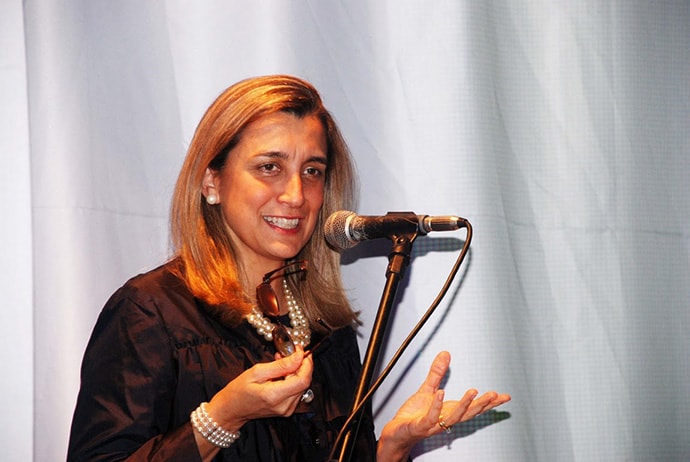
Susana Garcia-Robles speaking alongside Mexican fund managers on impact investment strategies.
Photo courtesy of Capria.
Early in her career Capria’s Susana Garcia-Robles was on the forefront of developing the private equity and venture capital markets in Latin America and the Caribbean while working with the Inter-American Development Bank. She recalls skeptical governments asking—so often she lost count—“[Is] innovation, entrepreneurship, and venture capital relevant to a region mired in poverty? Aren’t they just entertainment for rich young people?”
It wasn’t just governments that were confused by the role of impact capital in development. When the term “impact investing” was coined in 2007 to describe the goal of turning a profit while creating positive and measurable social and environmental impact, early investors lacked consensus on both methods and expectations. Some clarity came in 2009 when Jessica Freireich and Katherine Fulton of the Monitor Institute described the difference between “financial-first investors” and “impact-first investors.” (Long story short: it appeared that achieving both at the same time was not quite possible).
Today, investors of all stripes participate in an ecosystem that has grown significantly even at this early stage of its development. The 2020 Annual Investor Impact Survey put out by the Global Impact Investing Network (GIIN) estimated the size of the market to be $715 billion in assets worldwide, invested by more than 1,700 organizations. Impact investors now challenge the perceived incompatibility between social and financial gain, though consensus is by no means universal.
“If you don’t get returns, economies don’t grow.”
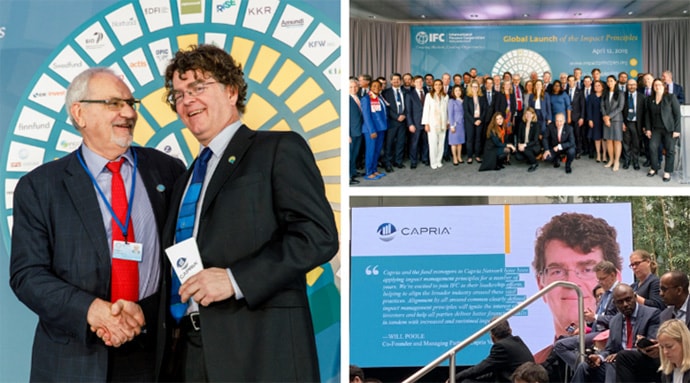
Capria partnered with its anchor investor, International Finance Corp., to be among the first to embrace IFC’s Operating Principles for Impact Management. Photo courtesy of Capria.
Founded in 2015, Capria has always rejected the assertion that investors must choose between social or environmental goals and financial returns. Capria’s successes in this area are a strong argument that it is possible to meet the dual goals of impact investing without compromising on either side. With a global network of funds representing $400 million in assets under management, Capria invests in early-stage venture capital, private equity, and other debt and equity funds in 37 countries in Latin America, Africa, and Asia through local fund managers and in some cases through direct investments. Their methods are built on lessons learned by investing in both developed and emerging economies. Capria’s leadership has deep experience in US-based technology companies, as well as through an early stage venture capital fund, Unitus Ventures.
“In a nutshell, we’re not an impact-first investor,” says Garcia-Robles, Capria’s Venture Partner. “Financial and social/environmental returns are at the same level of importance. How do we do that? Our ‘secret sauce’ is our collaboration.”
Capria leads the largest network of fund managers in what they term a pragmatic and collaborative approach that draws deeply on best practices in venture capital, impact measurement, and environmental and social governance (ESG) management. Capria’s cohort of fund managers span 22 countries and have a range of industry experience. When fund managers join the Capria Network they access professional peers as well as proprietary tools available through Capria Quantum, a system that includes templates, agreements, assessment tools, and resources of all kinds to increase fund managers’ knowledge and effectiveness.
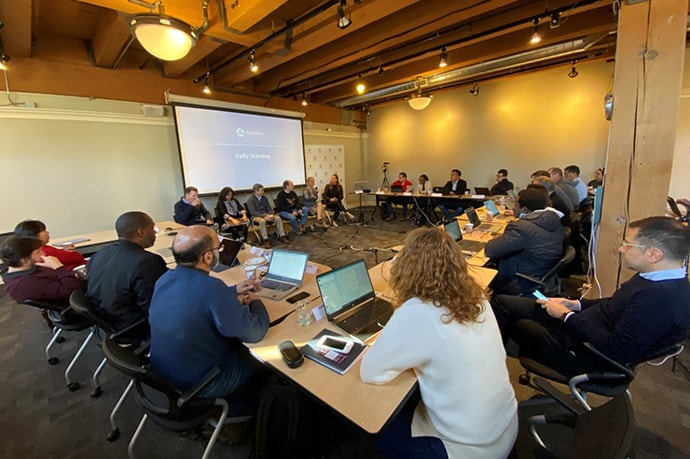
Capria’s 7th investment cycle culminated at the Seattle Impact Hall and included managers from Brazil, 3 countries in Africa, Singapore, and India. Photo courtesy of Capria.
Capria uses this model of a capacity-building network because it believes that the most successful early-growth investing must be led by local fund managers and teams that know their own markets and opportunities. As Garcia-Robles says, “[This model] is very effective because you’re empowering local teams who in turn empower local entrepreneurs.” Fund managers often take board seats on the companies they invest in, and any knowledge Capria shares with their fund managers can then be used to strengthen their portfolio of companies.
Using this model, Capria envisions “thriving entrepreneurial ecosystems” in dozens of new markets in order to realize its long-term goal of deploying $1 billion in capital to impact 100 million lives.
Crisis management and COVID-19
Capria’s approach has served the firm well during the current pandemic. Susana Garcia-Robles, who serves as Capria’s crisis manager, said, “When Covid hit, we had to move fast…. [Capria’s] vision comes through having been through many crises. We know that behind any crisis there also are new opportunities if you are realistic and pragmatic about going after them.”
After an intensive two-week period of information gathering and assessment at the very start of the pandemic, Capria began to create more tools to add to Quantum. These included a crisis preparedness tool, which was vetted and shared widely outside the Capria network, as well as a financial matrix that fund managers could use to analyze a business’s position and runway for exiting the crisis.
Capria has doubled down on the principles key to its model since the beginning. Twice a month Capria holds COVID-19 workshop meetings with its fund managers. Topics have ranged from lessons learned from past crises, to how to pitch investors during a pandemic, to legal aspects of the pandemic. All build on the shared knowledge and experience of the partners across the network.
Unexpected losers and not-so-obvious winners
In the beginning, the knee-jerk reaction to the crisis was the belief that every digital business would pull out of the crisis and every traditional business would not. When Capria’s network looked more closely at their portfolios and deal pipelines they saw that this was inaccurate. To highlight crisis management best practices, Capria held a workshop to showcase “unexpected losers and not-so-obvious winners,” including an app-based ride service in India that lost 70% of its revenue in the early weeks of lockdown only to recover by looking for drivers to deliver to people in their homes, and to serve new B2B logistics needs. Lesson learned? The app-based ride service was resilient because its founder was decisive and creative, not solely because of technology.
Capria also found in analyzing its portfolio that an orientation toward investments in essential products and services to bottom-of-the-pyramid consumers, such as minorities, women, and refugees, has proven resilient because they serve critical needs even during times of uncertainty. Capria’s goals to “go beyond job creation and give low-income families access to goods and services that would otherwise not exist” has proven to be smart business in both good times and bad.
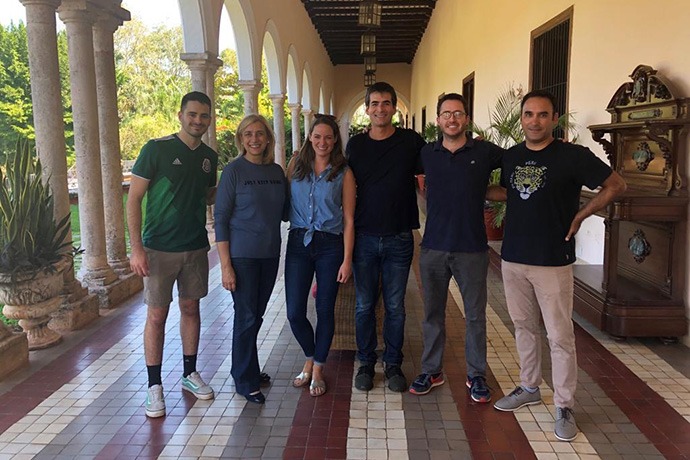
Susana Garcia-Robles (second from left) gathering with Co-Create LATAM.
Photo: Susana Garcia-Robles.
Other practices are pandemic-proof as well, such as their commitment to female fund managers and companies. Capria looks for women fund managers because as Garcia-Robles says, “[women] want to make just as much money as men, but…they also want to see if they can better the community and take care of the environment through their results and companies.” In fact, fund management teams with female managers invest in as much as 70% more female-led businesses compared to all-male teams. Capria also maps a company’s impact onto the Sustainable Development Goals (SDGs), creating “migrants to impact,” or companies that have begun to recognize their social impact when they consider their business’s contributions to the SDGs.
The long game
As the impact investing industry matures and Capria’s role in it continues, the tension—real or not—between social and financial gain will play out on an increasingly larger stage. We may be seeing, as Capria co-founder Will Poole said recently, “a cultural shift away from traditional notions of capitalism where profits trump all.” Time will certainly tell.
In the meantime, Susana and the Capria team are focused on ensuring that their funds, companies, and fund managers are around for the long haul. “Everyone has COVID fatigue but we really have to make sure our teams…are being creative and innovative and if you will, even energized by this. This has to be looked at as a new challenge, totally unexpected that the whole humanity is facing. And we’re going to come out better, knowing many new things.”
Goalmaker
Sasha Muench, Mercy Corps Country Director, Palestine
By Andie Long
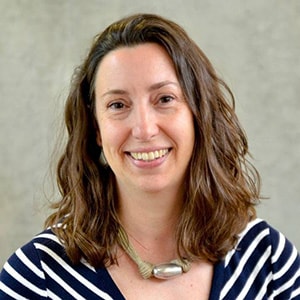 Sasha Muench, a twenty-year veteran of the international humanitarian and development agency Mercy Corps, had seen more of the world before she was a teenager than most people do in a lifetime.
Sasha Muench, a twenty-year veteran of the international humanitarian and development agency Mercy Corps, had seen more of the world before she was a teenager than most people do in a lifetime.
“For the formative years of my life, I was a nomad,” she says.
Both of Muench’s parents were development workers, trained in urban planning, and she and her sister grew up travelling across Africa and East Asia. She’s thankful her parents didn’t shield her and her sister from the realities of the places where they lived. “We did a lot of travelling, but always on a budget, very local. So I saw a lot of the world, and the grittiness of the world and the inequities.”
Together with their parents, she and her sister moved about every five years, a rhythm of life she continues to seek out today.
When Muench turned twelve, the family moved to the small town of Sequim in Washington state. “It was total culture shock,” she recalls. Muench knew that when she grew up, she wanted to return to the nomadic life.
‘Sometimes a loan isn’t enough’
As she was contemplating her future career, Muench said her father advised her: “‘don’t become an urban planner, it’s a useless degree. Go become an economist because they actually know how to solve problems.’ But then, “I became an economist,” she said, “and I thought, I’m not sure economists know how to solve problems either!”
The first major challenge in her career was supporting economic recovery after the war in Bosnia and Herzegovina. At the time, she says, there was a recognition that sometimes what people needed most was a loan to get back on their feet. As the work evolved, however, Muench and others came to see that often a loan wasn’t enough. In addition, she said, “you need connections, you need capacity, you need to know your markets.”
From there, Muench gravitated towards business development, and eventually she began working with institutions that could support individual business owners.
It was after the 2004 Indian Ocean earthquake and tsunami, when Muench was working in Indonesia, that she had an epiphany: “if we actually worked with the financial institutions to help the businesses recover, we could set up a long-term system that would help both of them.”
This thinking culminated in one of the most audacious programs of her career – the formation and launch of a wholesale microfinance bank in Indonesia. Together with a handful of socially-minded investors, including the Gates Foundation, Bank Andara was established to offer a range of banking products and services to hundreds of microfinance institutions, serving tens of thousands of retail clients in the island nation. Though Muench says Mercy Corps sold its share in the bank several years ago, Bank Andara continues to be one of the humanitarian agency’s top microfinance partners in the region.
‘Working ourselves out of a job’
As with Bank Andara, Muench approaches every humanitarian challenge with one thing in mind – sustainable change.
“I don’t want to be doing this work forever, and I don’t want to keep repeating the same things,” she says. “I think in the humanitarian industry as a whole, we should be working ourselves out of a job. And to do that we need to look at these broader systems.”
To do this, Muench leans heavily on her economics training. “What I like about markets in crisis,” she says, “is it’s using a lot of the principles around how economics works, and incentives, and how communities work, and applies it to moments of big change to see if we can lay the groundwork for long-term opportunity.”
“A chicken is not a job.”
While many development agencies tout gifts of livestock to poor families as a way to increase their incomes, particularly around the holiday season, Muench is known within Mercy Corps for her sassy retort – “a chicken is not a job!”
That said, Muench does think chickens are a great example of how taking a systems approach can create sustainable change.
“If you look at the poultry sector there are a lot of jobs, there are a lot of opportunities in there – from growing chickens, to processing them, to selling them, maintaining hygiene standards… If you actually work on that system, then it can create sustainable livelihoods for many people, and keep people alive, and healthy and fed. We shouldn’t be going around handing out chickens for the rest of our lives. We should be making the poultry system work so that people can live decent lives within that system.”
Muench insists there is an instinct in the industry to want to be the hero. But the more challenging and long-lasting approach, she says, is figuring out a way to help people solve their own problems.
“At the very least, because I am not here permanently, if I solve a problem, who’s going to solve it next time? So the best thing is if I can help somebody who’s going to be here forever, figure out the solution, and then they can keep adapting and changing so that people can get better. And if we don’t think about that, we can inadvertently do harm.”
Ultimately, it comes back to economics, she says. “When people are starving, we want to go in and give food. But then if we import a lot of food, what do we do with those farmers who suddenly can’t sell their crops because everybody’s got free food? Or the shopkeeper who can’t sell bread because everybody got free bread. But if we go and either give people cash so people can go buy the bread, or at least buy the bread from the shopkeeper and distribute it, then we’ve helped local business, we’ve helped people continue to maintain their business, and employ people, and helped the local economy grow.”
Opportunities in Palestine
Six months ago, Muench took a new position as Mercy Corps Country Director in Palestine, and moved to Jerusalem, along with her “cranky cat,” Izzy.
Though the role is one she admits she never anticipated wanting, she immediately found herself fascinated by the challenge. “There’s so much need here,” she says, “but it’s not a place that attracts a lot of philanthropy because of the politics.” That said, there is a great deal of opportunity: “If you look at the potential for economic growth in Palestine, it has a lot of the components it needs.”
One of the programs Mercy Corps runs in Palestine is Gaza Sky Geeks, a tech accelerator that supports entrepreneurial youth in earning a decent living through online freelancing and coding.
Not long after Muench arrived to take up her new role, COVID-19 hit. Most of the businesses Mercy Corps was working with in the West Bank had to close down, while the Gaza Sky Geeks continued operations, more or less as usual.
Mercy Corps currently has 50 staff in Palestine, most of whom are from the region. A majority are in Gaza, and the rest work in Jerusalem and Ramallah. Because of the technical savvy of the Gaza Sky Geeks staff and participants, they were able to shift to remote work fairly quickly, Muench said. They even managed to run a three-day online hackathon with 1,000 participants, called “Hack the Crisis Palestine,” which invited tech entrepreneurs to come up with solutions to the new COVID-19 reality. One group of entrepreneurs developed an app to support people’s mental health needs, enabling professionals to put their services online so people could find and use them.
What’s next?
Maybe it’s the COVID lockdown talking, but despite her nomadic ways, Muench has lately found herself hankering for the Pacific Northwest.
“I know this is probably really ironic for people stuck at home in Seattle and on the Peninsula, but as a Washingtonian who can’t come home right now, I want everybody to appreciate it,” she says. “All I want to do is go to the Dungeness River Center and stand on that bridge looking over the Dungeness River among the fir trees and look at the fish and just be home.”
From Our Blog
Responding to COVID-19 with Financial Inclusion Solutions
By Ed Cable, President
Mifos Initiative
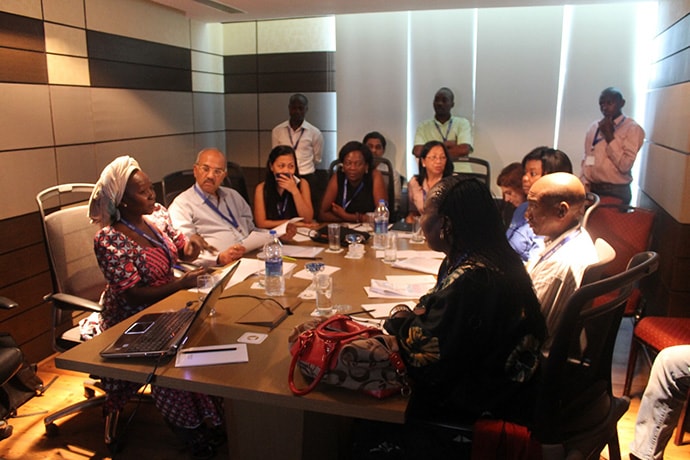
A gathering of Mifos partners. Photo: Mifos
Governments everywhere are seeking to soften the blow to small and microbusinesses from the COVID-19 pandemic, and to provide transfer payments to the most vulnerable individuals. At Mifos, we’re intent on bringing open source technologies for financial inclusion to meet this moment.
For example, we are poised to help governments by providing low-cost banking infrastructure to rapidly roll out accounts in the cloud through Mifos, as well as real-time payments through Mojaloop and our newly created Payment Hub. Built on open principles and standards, we catalyze inclusive fintech innovation, an ecosystem of providers, and enable the rapid delivery of government or humanitarian benefits to digital channels and accounts.
Our COVID-19 response section on Mifos.org highlights how to use these tools to rapidly respond to this crisis and also establish a foundation for fintech innovation. Our organization recently showcased our technology in a tech demo at the 2020 Global Digital Development Forum, and we detailed the challenges and opportunities faced in helping the informal economy recover in an article on NextBillion.net.
In much of the world, the ability of governments to send funds to small businesses or citizens is limited. They’re having to build the solutions in a time of crisis. To that end, we’ve been part of a coalition building out an OpenG2P framework, an effort to create a set of universal requirements and guidelines for implementing an end to end open source payments transfer system for governments. Based on work done by the government of Sierra Leone during the Ebola crisis, this is a bottom up effort.
Beyond this, many of our partners are building solutions powered by our core banking API (Application Programming Interface) layer, which allows them to easily build applications on top of the platform. These solutions are helping local financial institutions and digital financial service providers respond swiftly to the emerging needs of their customers. Examples include accelerated rollout of tablet-based operations for farmers in Myanmar (Musoni System) and the rapid deployment of online lending services to small businesses affected by the pandemic in Mexico (Banco del Bienestar). Our partners have also facilitated more flexible loan rescheduling, relaxed lending terms, extended grace periods, and overdue charge waivers for customers in India, South America, the Caribbean, and London.
This partner ecosystem is responding by building more tools and enabling the broadest financial inclusion possible. We believe the way forward is together.
Welcome New Members
Please welcome our newest Global Washington members. Take a moment to familiarize yourself with their work and consider opportunities for support and collaboration!
Avanade
Avanade is a global professional services company providing IT consulting and services focused on the Microsoft platform with artificial intelligence, business analytics, cloud, application services, digital transformation, modern workplace, security services, technology and managed services offerings. Avanade.com
GAPPS – Global Alliance to Prevent Prematurity and Stillbirth
GAPPS seeks to improve birth outcomes worldwide by reducing the burden of premature birth and stillbirths. We are working to close the knowledge gap in understanding the causes of preterm birth and stillbirth and collaborating to implement evidence based interventions to improve birth outcomes. gapps.org
Member Events
July 28: Girl Rising: A Global Conversation on the Impact of COVID19 on Girls’ Lives
Career Center
Communications Director, Days for Girls
Accounts Payable Clerk, Northwest Immigrant Rights Project (NWIRP)
Assistant Compliance Officer (PART TIME POSITION), Global Partnerships
Community Engagement Coordinator, PeaceTrees Vietnam
Check out the GlobalWA Job Board for the latest openings.